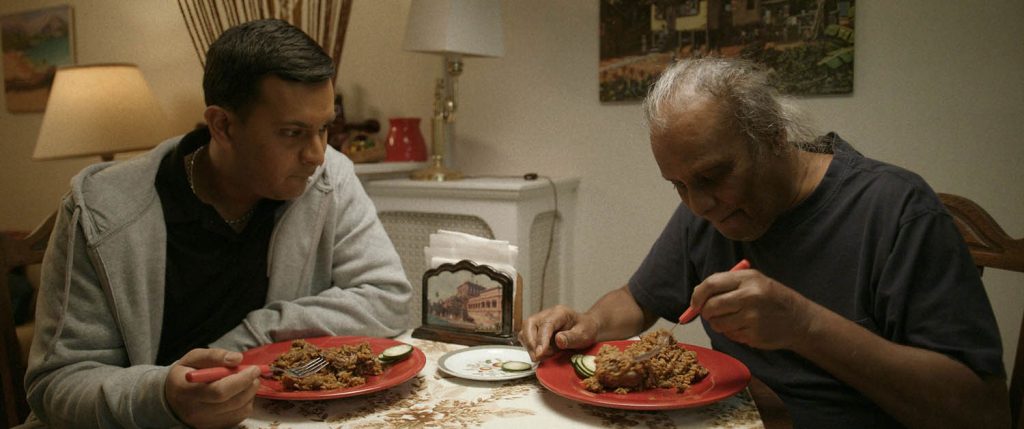Jonathan Ali talks to Ian Harnarine about his feature film, Doubles
Dhani is a young man who spends his days standing in the sun selling doubles, the popular Trinidadian street food. After his mother is robbed one night, a frustrated Dhani leaves Trinidad and flies to Canada to confront his father, Raghbir, who left the family years ago and who Dhani blames for their straitened circumstances.
Yet things aren’t as he imagined. Instead of a wealthy businessman, Dhani finds an old man washing dishes in a white-owned restaurant passing off inauthentic fare as Caribbean food. Dhani slowly fumbles towards reconciliation with his father, as he starts living Raghbir’s old dream of immigrant success.
Expanding upon his successful short film Doubles with Slight Pepper (2012), filmmaker Ian Harnarine — a Canadian of Trinidadian parentage, domiciled in New York — creates a sensitive father-son narrative in Doubles, his first fiction feature. He spoke to Jonathan Ali about migrant life, working with Trinidadian acting royalty and, of course, doubles.
What inspired this film? It’s tempting to assume an autobiographical impulse.
My goal is always to achieve an emotional truth even though what happened in the film did not happen in real life. The film is about the relationship that I had with my father — but I had a wonderful relationship with him, unlike the one depicted in the film. What inspired the film was my father’s descent with Alzheimer’s disease, and what it was like to be with him as he became a different person towards the end of his life. It’s those complex feelings that form the basis of the film.
The film is about a son in search of a father who went in search of the immigrant dream, a dream that eluded him.
I am interested in migration and the toll that it takes on families, both those that make the trip and those “left behind”. We create myths around immigrant success and what “success” means, so the film tries to examine that in a human way. The film is about a young man that unexpectedly understands his estranged father but is also seduced by the same lures that the father fell for. I wondered what the son would choose if given the choice of living the dream of his father or breaking free of those expectations and living life on his own terms.
The acclaimed Trinidadian actor Errol Sitahal gives a brilliant performance as the father.
I had my eyes on Errol Sitahal for many years after seeing his name in the credits of Alfonso Cuarón’s A Little Princess. I recognised his last name as one that must have been Indo-Caribbean. I followed his career as he played supporting roles, but he was always cast to give an Indian accent, which upset me. The man was so talented but never really had an opportunity to shine on film.
Caribbean people, regardless of race or nationality, are shown as an integrated community in the film.
Representation both in front and behind the camera was constantly on my mind. I am so happy to have worked with so many Caribbean people, specifically Trinidadian, in the film industry while making the film. For me, it is a representation of my reality in Toronto. If you were Trini, Guyanese, Jamaican, St Lucian, etc — there was a feeling of kinship whether at school, university or work. I know that’s true for even the older generation that arrived in the earlier waves of immigration in Canada. My hope is that the Caribbean audience feels the authenticity in this film and doesn’t feel betrayed like I do when I see inauthentic representation in Caribbean cinema.
Food is used in the film as a metaphor for cultural integration. It’s also a marker of the immigrant’s identity, and on an emotional level, cooking helps bring father and son together.
You’ve hit the nail on the head. The Caribbean community is separated by political borders, flags, currencies, ethnicities and histories, but food is what brings everyone together. Doubles have been the great democratiser in Trinidad. All walks of life enjoy it — and it’s spreading throughout the Caribbean. Throughout the diaspora it’s the same — everyone’s eating the food and it’s permeating through the wider culture. In the film, it’s the food that brings and will continue to keep that family together despite the past.
Doubles (2023)
Director: Ian Harnarine
Canada, Trinidad & Tobago
92 minutes

